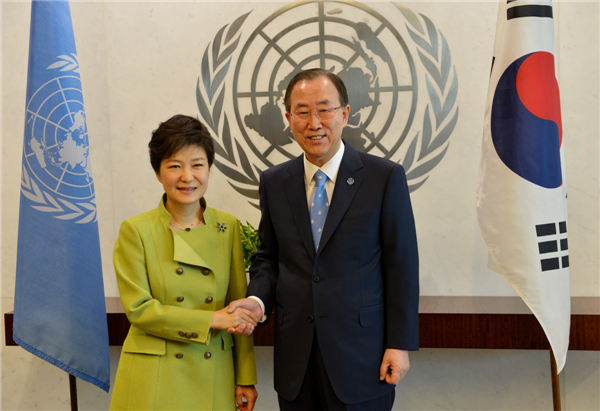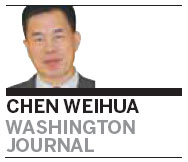DPRK nuke test to top Park-Obama discussions
Updated: 2013-05-07 08:04
By Chen Weihua (China Daily)
|
||||||||
 |
|
Park Geun-hye (left), president of the Republic of Korea, shakes hands with United Nations Secretary-General Ban Ki-moon on Monday at UN headquarters in New York. [Photo/Agencies] |
When the president of the Republic of Korea meets the president of the United States at the White House on Tuesday, it is widely believed that the crisis caused by Pyongyang's nuclear test in February will be high on the agenda.
ROK President Park Geun-hye, making her first overseas trip since assuming office, and Barack Obama are expected to send out a strong message of unity on the issue.
But Park's campaign pledge to activate a trust-building process with the Democratic People's Republic of Korea varies somewhat from the tough stance being taken by the US.
After the harsh rhetoric and military posturing over the past month between the DPRK and the US, tension has subsided following a flurry of diplomatic moves, including the visits to China made by US Secretary of State John Kerry and Chairman of the US Joint Chiefs of Staff Martin Dempsey.
Wu Dawei, China's chief envoy for the Korean Peninsula and chairman of the suspended Six-Party Talks, traveled to the US.
 The talks are unlikely to resume at the moment because the US insists that denuclearization is a prerequisite, and the DPRK has put forward several preconditions that are unacceptable to the US and the ROK.
The talks are unlikely to resume at the moment because the US insists that denuclearization is a prerequisite, and the DPRK has put forward several preconditions that are unacceptable to the US and the ROK.
Recent world attention has focused on the withdrawal of the last ROK employees from Kaesong Industrial Complex, a joint DPRK-ROK venture near the Demilitarized Zone.
Scott Snyder, a senior fellow at the Council on Foreign Relations, described the park as "the last remaining symbol of inter-Korea rapprochement" and called its closure a "lose-lose scenario".
Park's trip, however, will be about much more than the DPRK. The ROK will host an official dinner on Tuesday commemorating the 60th anniversary of the alliance between Seoul and Washington.
The visit also marks the first anniversary of the ROK-US free trade agreement. Trade between the two countries exceeded $58 billion in 2012, making the US the ROK's second-largest trading partner, though it trails far behind the $256 billion between the ROK and China.
The US is likely to again invite the ROK to the negotiations on the Trans-Pacific Partnership, a free trade agreement that the ROK has been reluctant to join partly due to the difficult discussion it will trigger in the ROK and also because of the impact on its free trade talks with China.
A Congressional Research Service report on US-ROK relations released last week described Park as appearing to place a priority on improving ROK's relations with China, which are generally thought to have been cool during Lee Myung-bak's presidency.
Park is hugely popular among the Chinese public as a female president in Northeast Asia and because of her ability to speak some Chinese.
Park, 61, the daughter of former ROK president Park Chung-hee, will also lead the largest ROK business delegation to the US. The 51-member group includes many tycoons, such as Samsung Chairman Lee Kun-hee.
Park and Obama will also discuss a 1974 nuclear agreement set to expire in 2014. The US has opposed the ROK's idea of acquiring enrichment and reprocessing facilities for fear that this would undermine Obama's global non-proliferation agenda and make it more difficult to persuade the DPRK and Iran to abandon their nuclear programs. The deal has been temporarily extended for another two years.
Cost-sharing for US forces in the ROK is also said to be on the agenda, given the defense budget cuts faced by the US.
Michael Green, the Japan chair at the Center for Strategic and International Studies, believes the two leaders will confirm that the US is going to transfer operational control on the peninsula in wartime from the US to ROK. Currently, the ROK has peacetime and the US wartime operational control.

 Michelle lays roses at site along Berlin Wall
Michelle lays roses at site along Berlin Wall
 Historic space lecture in Tiangong-1 commences
Historic space lecture in Tiangong-1 commences
 'Sopranos' Star James Gandolfini dead at 51
'Sopranos' Star James Gandolfini dead at 51
 UN: Number of refugees hits 18-year high
UN: Number of refugees hits 18-year high
 Slide: Jet exercises from aircraft carrier
Slide: Jet exercises from aircraft carrier
 Talks establish fishery hotline
Talks establish fishery hotline
 Foreign buyers eye Chinese drones
Foreign buyers eye Chinese drones
 UN chief hails China's peacekeepers
UN chief hails China's peacekeepers
Most Viewed
Editor's Picks

|

|

|

|

|

|
Today's Top News
Shenzhou X astronaut gives lecture today
US told to reassess duties on Chinese paper
Chinese seek greater share of satellite market
Russia rejects Obama's nuke cut proposal
US immigration bill sees Senate breakthrough
Brazilian cities revoke fare hikes
Moody's warns on China's local govt debt
Air quality in major cities drops in May
US Weekly

|

|







